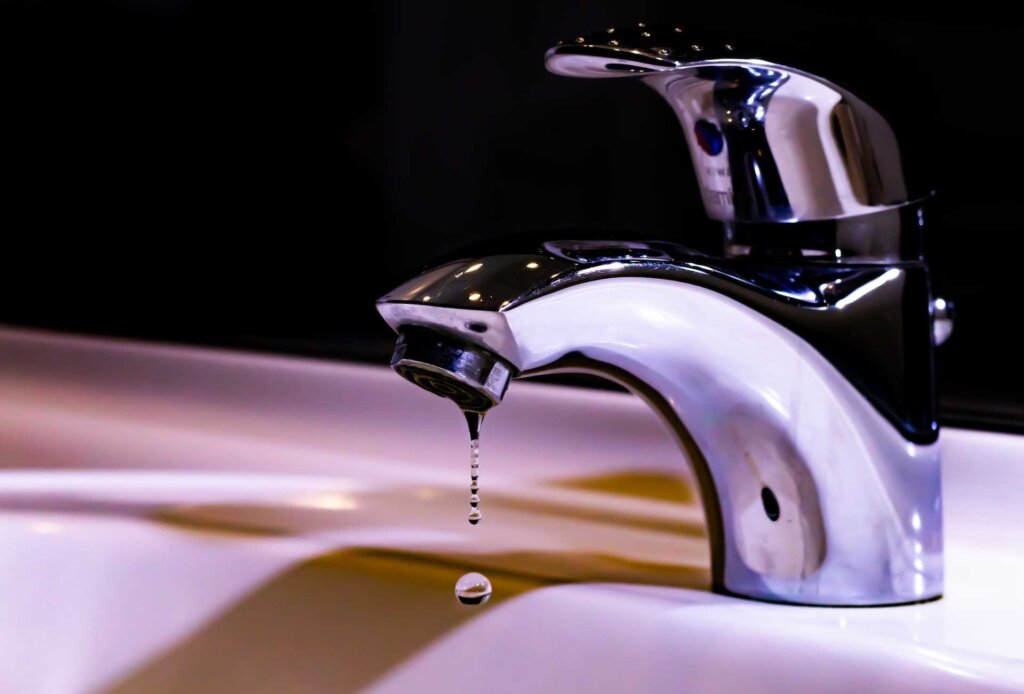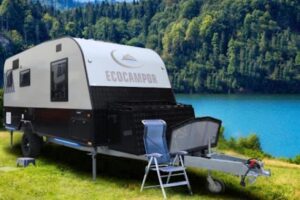So, what’s the deal? What’s happening when an RV’s water pressure drops for seemingly no reason?
Well, there are more than a few potential causes for low water pressure in an RV, and today I am going to cover as many as I can. I’ll tell you what to look for when troubleshooting low RV water pressure and what steps to take to go about fixing an issue.
For a better understand, you might light watching this video to increase the water pressure.
Tools You’ll Need
Whenever I’m diagnosing any sort of plumbing issue, I like to gather all of my tools in one place and have them on hand in case something springs a leak. It’s entirely possible to work on plumbing systems without ever spilling a drop, but accidents happen and it’s always best to be prepared for the worst.
The following list of tools and materials are what I keep in my plumbing diagnostics kit. With just the items on this list, I can troubleshoot most plumbing issues, and even fix a majority of minor problems.
- Phillips and straight-slot screwdrivers
- Wrench set
- Small pry bar
- Needle-nose pliers
- Slip-joint pliers
- Hose-clamp pliers
- Constant tension hose clamps
- Screw clamps
- Plastic pipe cutters
- Plumber’s cement
- Flashlight or headlamp
- Bucket
- Gloves
- Large towel
- Blue workshop paper towels
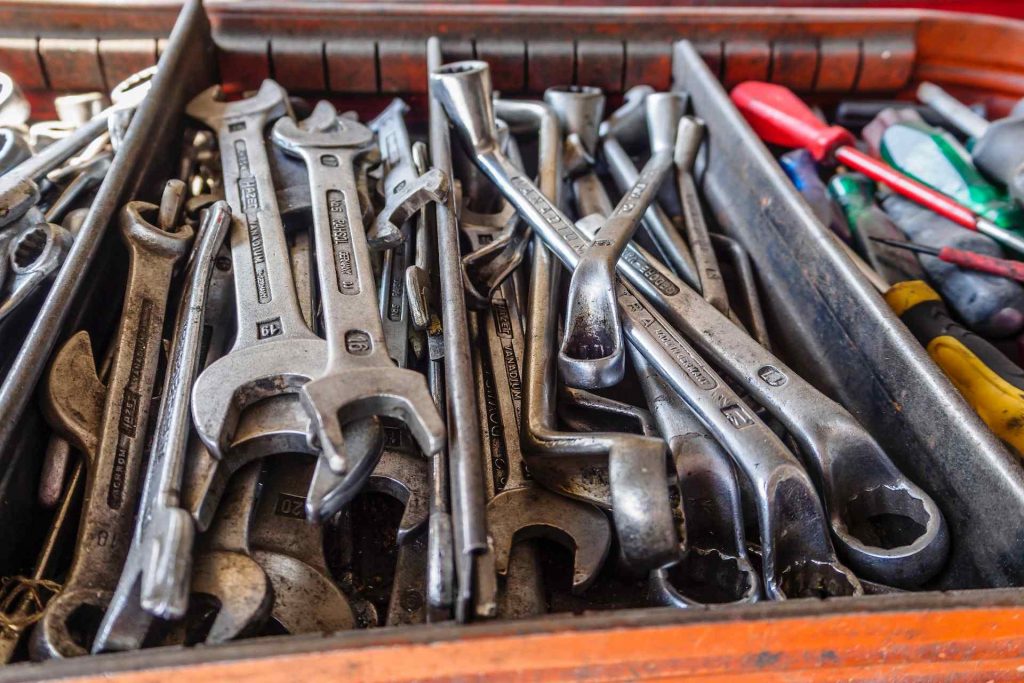
Troubleshooting Low RV Water Pressure
While RV plumbing systems are fairly simple, they do contain a lot of components. So even if a plumbing system is easy to assemble and work on, there are still many parts that need to be examined to determine if they are the source of the RV’s low water pressure.
Freshwater Hose
When an RV park offers a water connection, a camper is connected to that system via a drinking water hose.
Similar in appearance to a standard garden hose, a drinking water hose has threaded connections on each end and is made of a food-safe material that won’t leach chemicals into your drinking water. One end of the hose gets screwed onto the spigot provided by the campground, and the other end screws onto the freshwater inlet.
When connected to an RV park’s water supply, a camper is at the mercy of the park’s water pressure. So, if the hose connecting your rig to the spigot has gotten bent or kinked in a way that reduces the flow of water through the hose, the water pressure in your RV will suffer.
Thoroughly examine the water hose leading to your rig and straighten any kinks that you may find. This should have an immediate effect on your water pressure if it is in fact the issue. The longer your freshwater drinking hose, the more likely kinks and bends are to happen.
When connecting your camper to a water source, be careful to stow extra hose length in a safe spot that won’t be tripped over, driven over, or chewed on by dogs.
Water Tank
Sometimes the cause of a problem is hard to determine because it is just so simple.
Low water pressure in an RV can be caused by running low on fresh water. Sounds pretty obvious because it is. But nonetheless, many RVers, newbies and veterans alike, have been stumped by low water pressure issues only to later realize that their freshwater tank is almost empty. Don’t worry, it happens to the best of us.
Fill up your tank and hopefully your water pressure issues will be resolved.
Check RV Park Water Pressure
Even if your hose is perfectly straight and un-kinked, the problem still could be coming from the RV park. Sometimes an RV park just has really poor water pressure. This could be due to the park’s water pump being weak and old, or from there being an abundance of RVers hooked up to and drawing from the system. Even a strong water pump can be overburdened at times.
So, how does one go about determining if the water pressure issue is stemming from the RV park and not one’s own rig? Well, RV life veterans have figured out a clever little way to figure this out, no tools required.
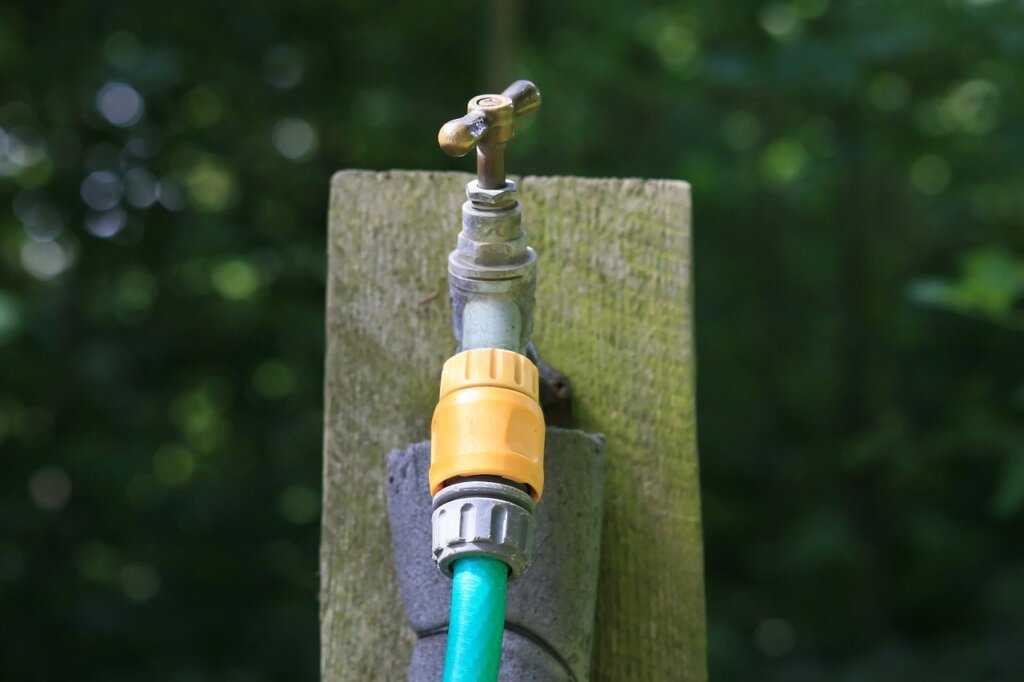
To start, what you’ll want to do is go to the faucet in your camper that is furthest away from your RV water pump. Turn it on full blast and take a mental note of how strong the flow of water is.
Next, go outside and disconnect your camper from the park’s water supply. Make sure your freshwater tank is at least half full. If it is not, go ahead and top it off while you are standing there with the freshwater hose.
Now go inside and start up your RV’s water pump. Return to the faucet furthest away from the water pump and turn it on full blast again. If the water pressure has increased since being disconnected from the park’s water supply, then you can rest easy knowing that the issue is with the park’s system and not yours.
If this is the case where you are camping and you are faced with several more days or weeks of relying on a water system with crappy water pressure, I recommend not suffering from a reliance on that system. Just regularly fill up your freshwater tank from the park’s supply and utilize your own water pump for sustained, useful water pressure. Sure, it may put a bit more strain on your water pump than you want, but I think it’s worth it to not have to endure unsatisfying showers and tedious dish washing.
Pressure Regulator
An RV water pressure regulator is a crucial piece of equipment to have to protect your RV’s plumbing system. When unregulated, water pressure from a campground or city water supply can exceed the pressure limitations of your system and end up wreaking havoc on your water lines, plumbing components, and fixtures.
What a water pressure regulator does is control the flow of water entering an RV, and if necessary, lower the pressure to a level that is safe for the rig.
If the pressure setting on the regulator is set too low, it will result in low water pressure for your camper. A water pressure regulator can be adjusted by turning a small, straight-slot screw located either on the top or the side of the device. Adjust the regulator setting in small increments to ensure you don’t exceed your rig’s capabilities.
RV Water Pump
At this point, if you’ve checked that your water pressure issues aren’t coming from your freshwater hose or the RV park’s water supply, then it’s safe to assume the issue lies somewhere within your own plumbing system. And where best to start troubleshooting a water pressure issue than the source of water pressure itself? Your RV water pump.
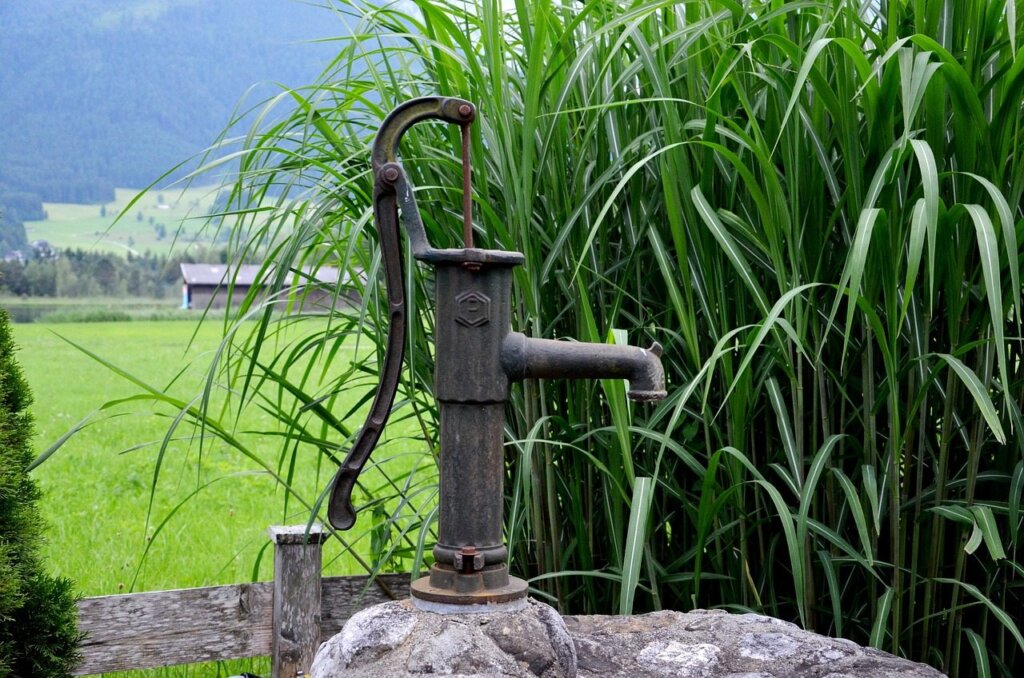
When not connected to an external water supply, a water pump is the sole source of RV water pressure. An old or inadequately sized water pump can lose the ability to provide steady water pressure for a rig.
Now, I feel that it’s worth mentioning that your ability to inspect your water pump for malfunctioning parts is going to entirely depend upon how handy you are, your confidence, and your willingness to try. If you don’t trust your ability to disassemble and reassemble a water pump, it’s probably best to take your rig to a certified RV technician to have it inspected.
To inspect your RV water pump, first disconnect power to the pump via either the breaker or the 12-volt fuse block. Now, go to the pump and locate the fuse. Pull it out and check if it has blown. If the fuse has blown, replace it with a fresh one, resume the flow of power to your pump and check if that was your problem.
If the fuse hasn’t blown, then your issue is likely internal. Thoroughly examine the pump for cracks and signs of damage. Remove the screws holding the top of the pump to the main body and look for damage, signs of built-up residue, or moving parts that have gotten stuck. If you find any problems, determine if it can be fixed via realignment or a replacement part, or if the whole pump will need replacing.
Check out this video by YouTuber, Why Wait, if you would like to see how a standard RV water pump is disconnected and disassembled.
Water Filter
An RV water filter is a key player in any camper’s plumbing system. A good filter allows RVers to fill their freshwater tank from spigots at various gas stations and RV parks and trust that the water is safe for drinking when it comes out of their RV’s faucets.
Over time a water filter will become clogged with sediment, debris, and minerals that it has filtered out of water. This can be inconvenient, but it’s actually a really good sign. A clogged filter means that the filter is actually doing its job and is removing unwanted material from your water. But a clogged water filter can also decrease the water pressure in your RV.
Water filters can be examined and replaced exceptionally easily. All you need to do is unscrew the filter housing from the filter unit and remove the filter itself. Most RV water filters are clean and white when new. If your used water filter has turned orange, brown, or green, and has visible sediment and debris caught on it, then there is a chance that it is causing your water pressure issues and should be replaced.
Water Lines
Over time an RV’s water lines can crack and spring leaks. Any leak in a plumbing system will reduce water pressure, so it’s very important to stay on top of inspecting your water lines regularly.
Check for cracks and leaks along each water line and at each fitting. Anywhere a water line feeds into or out of a component should be inspected for water leakage. If you suspect that a water line in your camper’s walls might be leaking, an RV technician will have the tools and knowhow to get in the walls and check the pipes for you.
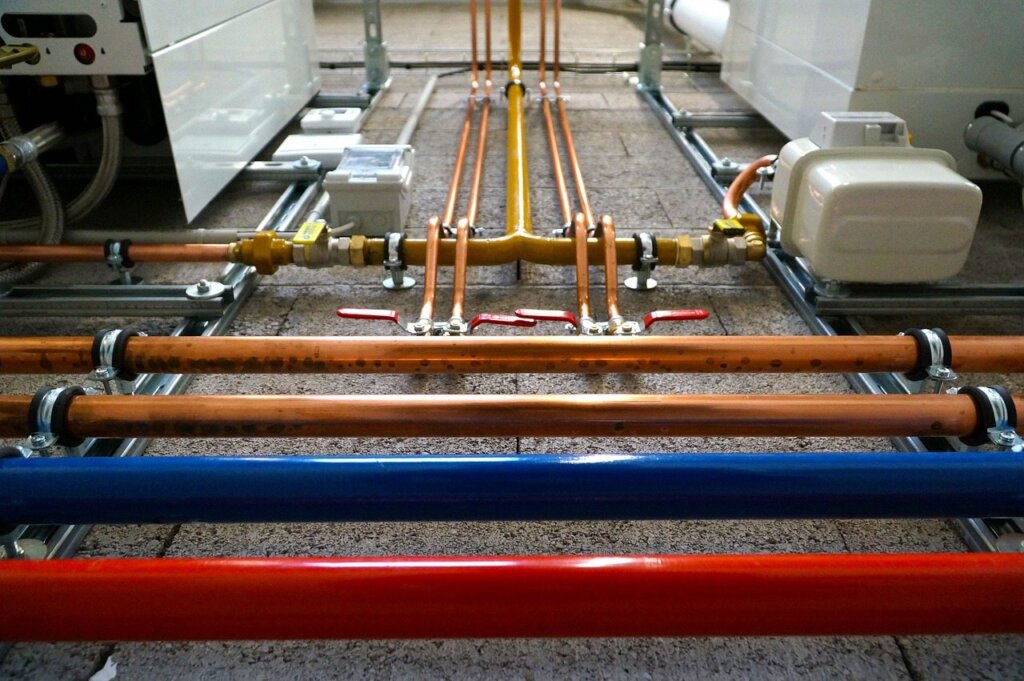
Frequently Asked Questions
Low water pressure is frustrating, and our readers demand answers.
How do I get more water pressure in my RV?
If you are unsatisfied with your camper’s water pressure even when the system is in perfect working order, then it may be time to upgrade your water pump. If you are not ready to pull the trigger on a new pump, look into buying a water pressure booster pump.
Can my water pump pressure be adjusted?
Yes. Most RV water pumps can be adjusted by turning a small Allen head screw on the top of the appliance.
Is my water heater causing low water pressure?
Potentially. If you suspect that your water heater is causing water pressure issues in your rig, schedule an appointment with a professional RV technician for a water heater inspection.
At the end of the day, if you’ve checked all of the normal water pressure problem spots and still cannot suss out the issue, then it’s best to take it to the shop. RV technicians have seen it all and will certainly be able to find your issue.
If you are a full time RVer that wants to avoid having the rig in the shop if possible, digging around YouTube and RVer forums online is your best bet.
Good luck finding your issue! To keep a positive mindset about the whole thing, try not to view your low water pressure as an annoying inconvenience, and instead view it as a unique opportunity to get to know your plumbing system more intimately.
Happy camping!

